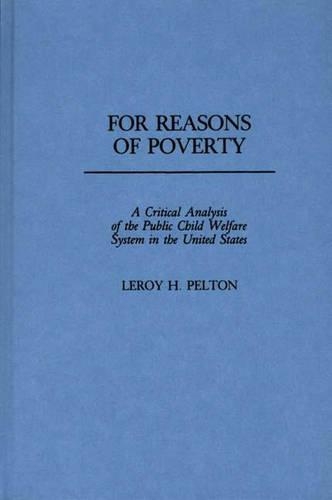
For Reasons of Poverty: A Critical Analysis of the Public Child Welfare System in the United States
(Hardback)
Publishing Details
For Reasons of Poverty: A Critical Analysis of the Public Child Welfare System in the United States
By (Author) Leroy Pelton
Bloomsbury Publishing PLC
Praeger Publishers Inc
6th December 1989
United States
Classifications
Tertiary Education
Non Fiction
362.7320973
Physical Properties
Hardback
220
Width 156mm, Height 235mm
454g
Description
The public child welfare system has been increasingly attacked for failing to implement long-standing national policies, especially family preservation. Pelton, a social work educator, continues this attack, but in a uniquely comprehensive, coherent, and compelling manner. His well-documented critique focuses on the philosophical underpinnings and internal workings of public child welfare, especially its medicalization of child abuse; inappropriate out-of-home placement of children for reasons of poverty; excessive reliance on foster care; and dysfunctional dual structure (investigative versus helping roles). . . . [His] analysis is powerful and provocative and should be required reading for all engaged or interested in child welfare. Choice This volume reveals how the modern public child welfare system and its forerunners have failed to serve professed child welfare policies that have been enunciated from the beginning of this century to the present. The basic dynamics, operational structure, and direction of the child welfare system are thoroughly scrutinized by Pelton with the intent of promoting productive controversy. One of the central issues discussed by the book is the separation of children from their parents by child welfare agencies. Evidence is presented that shows that, throughout this century, child removal has survived as a major tactic in regard to child welfare problems despite a long-standing policy of family preservation. This is the only book to be critical not only of the child welfare system, but of recent attempts to improve it, namely, the permanency planning movement. It is also the only one to propose an entirely new structure for the child welfare system. For Reasons of Poverty begins with a historical review of child welfare through the twentieth century and then examines the crusade against child abuse. Next, the book covers the foster care system, the permanency planning movement, and the dual role of the child welfare system. The last chapter of the volume focuses on a plan for restructuring the child welfare system in the United States, which Pelton believes could be realistically accomplished within the larger ongoing economic and social welfare policy context. This book should be of particular interest to child welfare administrators in public and private agencies and to child welfare advocates and social workers. Additionally, it contains information applicable to a number of different fields, including social work, public policy, sociology, and psychology.
Reviews
Dr. Pelton gives specific recommendations, among them the development of standards and guidelines for placement decision-making, and offers a model for restructuring the public child welfare system which would do away with the dual role structure and empower the child welfare worker to carry out the agency's role of advocating for families and children.-A Common Ground
The public child welfare system has been increasingly attacked for failing to implement long-standing national policies, especially family preservation. Pelton, a social work educator, continues this attack, but in a uniquely comprehensive, coherent, and compelling manner. His well-documented critique focuses on the philosophical underpinnings and internal workings of public child welfare, especially its medicalization of child abuse; inappropriate out-of-home placement of children for reasons of poverty; excessive reliance on foster care; and dysfunctional dual structure (investigative versus helping roles). The author also proposes restructuring the system by having child abuse and separation issues handled by the courts; assigning investigative functions to the police; placing foster care under court jurisdiction; and creating all-purpose child welfare agencies to provide emergency, supportive, and preventive services to families. Pelton's central thesis is somewhat overstated and his proposed solutions are rather debatable. There is no question however, that his analysis is powerful and provocative and should be required reading for all engaged or interested in child welfare, upper-division undergraduate level and above. Excellent bibliography and index.-Choice
"Dr. Pelton gives specific recommendations, among them the development of standards and guidelines for placement decision-making, and offers a model for restructuring the public child welfare system which would do away with the dual role structure and empower the child welfare worker to carry out the agency's role of advocating for families and children."-A Common Ground
"The public child welfare system has been increasingly attacked for failing to implement long-standing national policies, especially family preservation. Pelton, a social work educator, continues this attack, but in a uniquely comprehensive, coherent, and compelling manner. His well-documented critique focuses on the philosophical underpinnings and internal workings of public child welfare, especially its medicalization of child abuse; inappropriate out-of-home placement of children for reasons of poverty; excessive reliance on foster care; and dysfunctional dual structure (investigative versus helping roles). The author also proposes restructuring the system by having child abuse and separation issues handled by the courts; assigning investigative functions to the police; placing foster care under court jurisdiction; and creating all-purpose child welfare agencies to provide emergency, supportive, and preventive services to families. Pelton's central thesis is somewhat overstated and his proposed solutions are rather debatable. There is no question however, that his analysis is powerful and provocative and should be required reading for all engaged or interested in child welfare, upper-division undergraduate level and above. Excellent bibliography and index."-Choice
Author Bio
LEROY H. PELTON is Professor and Chair of the Children and Family Services Concentration in the School of Social Work at Salem State College in Salem, Massachusetts. Dr. Pelton is the author of The Psychology of Nonviolence and editor of The Social Context of Child Abuse and Neglect. He has authored numerous journal articles and other publications in psychology and social work.
